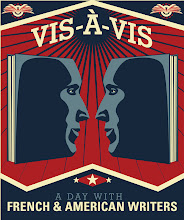Thursday, May 13, 2010
Interview of Jean-Christophe Harel, Cultural Attache at the French Consulate in Los Angeles
Interview of Jean-Christophe Harel, Cultural Attache at the French Consulate in Los Angeles.
A few logistics points
We strongly encourage alternative transport: Walk, Bike, Blue Bus #2 or Metro #33 or #333.
However, we also have free, on-site parking for the last session @ Electric Lodge from 3pm, 1416 Electric Ave., Venice, CA 90291.
We hope you will come numerous, see you on Saturday!
Agrandir le plan
Wednesday, May 12, 2010
Workshops dedicated to children literature.
The festival has put in place workshops dedicated to childrens:
10:30am - 1:00pm
Workshops for kids
Ecole Claire Fontaine - 226 Westminster Ave., Venice, CA.
1:30pm - 6:00pm
Literary workshops for kids with the Alliance Française de Los Angeles
Abbot Kinney Memorial Branch Library - 501 S. Venice Blvd., Venice, CA.
Tuesday, May 11, 2010
Vis-à-vis: a festival supporting green incentives
The Electric Lodge is a laboratory for artists and environmentalists, a torch bearer in the effort to stimulate public understanding and support for the creation of a sustainable worldwide eco-system. Through our Arts Earth Partnership and other programs it becomes a nexus for a network of environmentally friendly cultural facilities, performing arts companies and individual artists in Los Angeles and across the country, uniquely manifesting our identity as the place where artistic and environmental ideas are presented and explored.
Other venue, same interests, The G2 Gallery believes in the union between environmental causes and the power of photographic art to change the world. It shares this passion with the world’s best photographers, who use their camera as a tool to inspire conservation. The gallery donates all proceeds from art sales to environmental causes.
Another reason to join us on May 15th...
Download the full program here
Wednesday, May 5, 2010
The History of Forgetting: Los Angeles and the Erasure of Memory, by Norman Klein

Los Angeles is a city which has long thrived on the continual re-creation of own myth. In this extraordinary and original work, Norman Klein examines the process of memory erasure in LA. Using a provocative mixture of fact and fiction, the book takes us on an 'anti-tour' of downtown LA, examines life for Vietnamese immigrants in the City of Dreams, imagines Walter Benjamin as a Los Angeleno, and finally looks at the way information technology has recreated the city, turning cyberspace into the last suburb.
"Klein clearly follows in Mike Davis's wake, but develops a distinctive focus on the erasure of memory in and about the city." Times Literary Supplement
"Klein is a fine stylist, an engaging historian – his account of the way noir shaped the city is strikingly fresh." New Scientist
"Norman Klein is full of ideas, brilliantly and beautifully expressed". Journal of Americann History
Tuesday, May 4, 2010
Unforgivable, by Philippe Djian

Djian’s spare and eloquent literary novel, translated smoothly from the French by Cameron, won the 2009 Prix Jean Freustié and is currently being filmed by French director André Téchiné . In just over 250 pages, Djian manages not only to draw a fascinating portrait of the main character, author Francis, but also to sketch his family members, including his current wife; his daughter, an actress and addict, and her banker husband; and their silent twin daughters. All are caught in the backlash of a family in conflict. Djian chronicles Francis’ breakdown after his daughter disappears and the effects that the tragedy has on the entire family. Powerful and moving, Djian’s story is both a thriller and a psychological study; the narrative moves back and forth in time as the current tragedy reminds Francis of the deaths of his first wife and elder daughter. Suggest to readers who enjoy spare literary novels that reveal depth of character while unfolding a compelling plot. --Jessica Moyer
“A long journey of doubt, of obsession, and, above all, of setbacks and blows. Economic prose . . . and very sharp. Djian's language rings true.” Métro

“Djian has the genius to succeed in two genres at once, the genre of the intimate diary . . . and the ?sea, sex, and sun' genre, stormy at times. He writes panoramically, wide-screen, the seaside under a telescope, Californian sky, the angle of the camera well-chosen between the lawn and the garden path . . . Unforgivable is the account of a misanthropic charmer . . . you won't be bored for a second.” Le Point
“Djian, here at the height of his talent, is capable of giving life to the sixty-year-old Francis, at once violently egocentric and infantile, engaging and unreasonable . . . a profoundly thoughtful novel . . . the minute examination of parent-child relations, the theme of forgiveness and of mercy, are only at the surface of a much larger aesthetic and ethical ambition: to detail the craft of life and love . . . remarkably well done.” Télérama
“Philippe Djian [delivers] a beautiful exercise of self-deprecating humor . . . Various reflections [on] paternity, on writing, on relationship erosion, and on aging, [Unforgivable] treats serious subjects . . . with seriousness but without taking itself too seriously.” L'Express
“Philippe Djian has no equal, amongst French authors, as the interrogator of the relationships that bind human beings together . . . it is this humanity—tackled head-on in all its complexity—that draws him close to the great Anglo-Saxon writers. Djian is incontestably the most American of French writers.” Vogue (France)
“[Djian's] imagination has rarely been as fertile . . . a reflection on the way literature ingests the whole life of an author. That, for Djian, is surely true.” Livres Hebdo
“[Unforgivable] is a vertiginous fall . . . [using] flashbacks, a host of dilapidated secondary characters, country roads, and stylistic brainwaves . . . Unforgivable resembles its author: a dark and disquieting gaze, strong nerves . . . and an irresistible charm.” Elle
“[Unforgivable] is impossible to put down.” Libération


